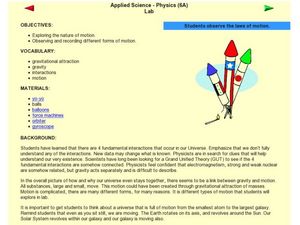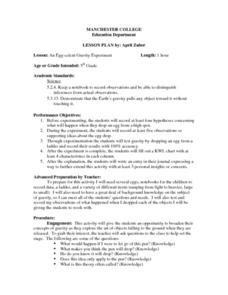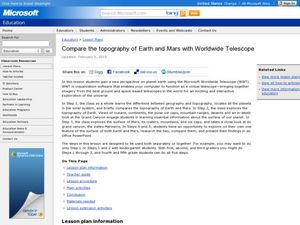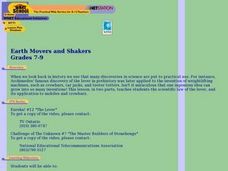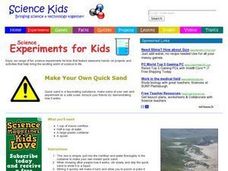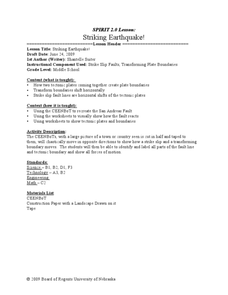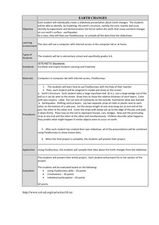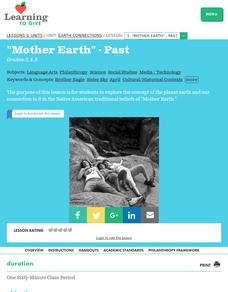Curated OER
What is Science?
Students explore physical science by conducting a plant experiment. In this scientific method lesson, students discuss questions scientists ask in order to properly explore certain subjects. Students utilize two plants and place one in...
Curated OER
Motion Experiment
Students experiment with the laws of motion. In this motion lesson, students explore Newton's Laws of Motion. Students work in groups experimenting with different objects and observing different types of motion.
Curated OER
An Egg-celent Gravity Experiment
Fifth graders record at least four hypotheses concerning what happens when they drop an egg from a high spot. They record at least five observations or supporting ideas about the egg drop. Students test gravity by dropping an egg from a...
Curated OER
Earth Forces
Students use geological techniques such as plate tectonics, mountain building, earthquakes, and volcanoes, in order to explain the earth.
Curated OER
Compare Topography of Earth and Mars with a Worldwide Telescope
Young scholars compare geography to topography. In this topography lesson, students examine the topography of the surfaces of the Earth. Young scholars compare one feature of Earth to one feature of Mars and present in a PowerPoint.
Curated OER
Earth Movers and Shakers
Students explore how the centuries-old invention of the lever led to today's applications in mobiles and crowbars. They watch a video on the lever, then utilize worksheets imbedded in this plan to guide their experiments.
Curated OER
Tsunami! Examining Earth's Most Destructive Waves
Students investigate just what a tsunami is, what causes it, how fast it travels, what it looks like, and its devastating effects upon landfall. They read the experience of a former Peace Corps Volunteer who went to Sri Lanka after it...
Curated OER
Weather and Oceans: Uneven Heating of the Earth
Students investigate what causes the heat on Earth. In this Earth heating instructional activity, students experiment with different heat sources and determine where the Earth gathers the most heat. Students explore vocabulary words...
Curated OER
Make Your Own Quick Sand
Young scholars create a quick sand model using cornflour and water. In this earth science lesson, students explain why stirring the mixture quickly makes it thick but the opposite happens when you stir it slowly.
Curated OER
Why Is Our Stream Changing?
Learners test turbidity, pH, oxygen content and temperature of local stream. In this earth science instructional activity, students collect and record data from the experiment. They analyze findings and present it to class.
Curated OER
Day And Night: Interdisciplinary Study of Cyclic Change
Eighth graders conduct a "Length of Day Symposium." They complete a variety of activities and explorations regarding the earth's rotation, its revolution around the sun and the cyclic changes in climate and energy distribution on the...
Curated OER
Jeopardy
Providing an interactive experience, this Jeopardy-style game leads players through a review of scientific concepts. The presentation covers topics such as sound, the Earth's layers, magnetism, and the states of matter. This would be a...
Virginia Department of Education
Determining Absolute Age
How can radioactive decay help date old objects? Learners explore half-life and radioactive decay by conducting an experiment using pennies to represent atoms. Young scientists graph data from the experiment to identify radioactive decay...
Maine Math & Science Alliance
Earth as a System
Ecosystem, human body system, weather system. We hear the word system a lot, but what does it really mean? In the activity, pairs or groups of learners discuss how a bicycle is a system and then analyze objects in their classroom and...
Curated OER
The Earth's Atmosphere and Temperature
Students describe and compare the layers of the atmosphere. They explain how to measure the temperature of the atmosphere and discover what causes the atmosphere to heat up in some places more than in others.
Curated OER
Connect the Spheres: Earth Systems Interactions
Is everything really connected? Take your class on a walk outside, where they will make observations and write them down on a worksheet. Once they are back in the classroom, learners will work to determine if and how things like birds,...
K20 LEARN
Transpiring Trees: Plant Transpiration and the Water Cycle
Looking for a tree-rific addition to your water cycle unit? Teams of young foresters examine the role of transpiration in the water cycle through a week's worth of activities. Pupils analyze how trees take in and transport water during...
Curated OER
Miller-Urey Experiment Amino Acids & The Origins of Life on Earth
Learners study the Miller-Urey Experiment including its history and criticism. In this origins of life lesson students repeat this experiment to see how it works.
Curated OER
Striking Earthquake!
Students simulate strike slip faults using CEENBoTs. In this earth science lesson, students identify the fault lines and tectonic plates on a world map. They label the different parts of a fault line.
Curated OER
Converging Earthquake!
Students identify the fault lines and tectonic plates on the map. In this earth science lesson plan, students simulate landscape formation using robots. They take a quiz at the end of the lesson plan to demonstrate mastery.
Curated OER
Earth Changes
Students investigate the earth's structural layers by participating in hands-on activities. They identify the earth's structure and investigate earthquakes.
Curated OER
Earth's Radiation Budget
Twelfth graders explore the Earth's radiation budget using Earth radiation Budget Experiment (ERBE) data archived at the IRI/LDEO Climate Data Library. They use photometers and light sources to work through several hands-on activities...
Curated OER
"Mother Earth" -- Past
Students examine our connection to the Earth. They identify how Native Americans believed in a "Mother Earth". They discover how the earth and life are connected.
Curated OER
The Water Cycle
Students identify the various ways water move throughout the earth as part of the water cycle. In this science lesson, students gain a knowledge of basic science concepts related to everyday life through patterns and how they repeat as...



